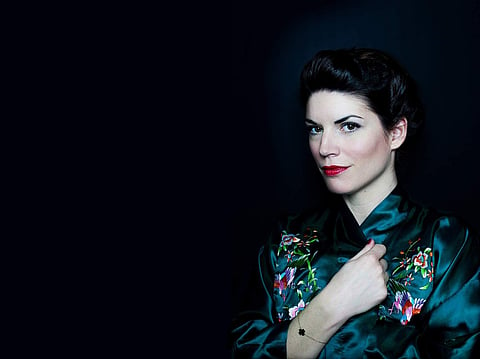
- LIFESTYLE
- FASHION
- FOOD
- ENTERTAINMENT
- EVENTS
- CULTURE
- VIDEOS
- WEB STORIES
- GALLERIES
- GADGETS
- CAR & BIKE
- SOCIETY
- TRAVEL
- NORTH EAST
- INDULGE CONNECT

Maud Andrieux, the theatre artiste based in France, has been following the work of French writer and filmmaker Marguerite Duras since 2004, having adapted and interpreted several of the latter’s works, such as The Sea Wall and The Vice-Consul. It all started when Maud read The Sea Wall (titled originally as Un barrage contre le Pacifique), an experience which she describes as a “historical and literary slap”.
“It was a great autobiographical account of injustice and hope in yesteryear French Indochina,” she says. Maud, who is also an actress on the big screen (Chair éternelle, La nuit du meurtre), now comes to India with an adaptation of another of Duras’ historical works, L’Amant, also called The Lover, with elements from a subsequent variant of the same, The Lover of North China.
Maud explains, “Duras first wrote the first novel in 1984 and won the Prix Goncourt, a literary prize that made her internationally known. This novel was later adapted on the big screen by Jean-Jacques Annaud. Duras, however, rewrote the same story after the release of the film because she was dissatisfied with the film adaptation. Therefore, in the second novel, she elaborates the elements of staging and light. So I worked on these two novels to make a combined show of one hour.”
However, adapting a 350-page novel on stage is not easy, as Maud discovered. “Of course, the whole book is not there. But I always remain extremely faithful to her writing and narrative,” she says. In her play, she delivers a French monologue, describing the intense love story between the French girl and a Chinese-Vietnamese man. “The racism of the colonial era and the difference in social origins and skin colour make their destiny impossible. And yet both of them remember their whole life for the extraordinary love they shared,” she says, adding that the text in the book is also a critical insight into the life of the author herself. “Besides being engaged in the Second World War, she defended the rights of women in French society all her life. This text speaks about her childhood, family and her emotions — what made her a free and committed woman,” shares Maud.
The music for the play has been composed by Marco Gomes. “Marco first understood the world that I wanted to depict in this play and listened to my voice in the studio,” she says. As for the set, lighting plays an important role here. “Duras’ writing is simple in its vocabulary, and is musical and cinematographic in nature. Therefore, I worked with my technical director Frédéric Paquet on lights that create different spaces, plus lightweight furniture that evokes and serves its purpose,” Maud says, adding that English subtitles will be projected on the screen throughout the play. After the show in Chennai, the play will travel to cities like Chandigarh, Pune, Mumbai and Kolkata, followed by tours in Thailand, Vietnam and France.
At Alliance Française of Madras. October 25. 7.30 pm. Tickets available online.